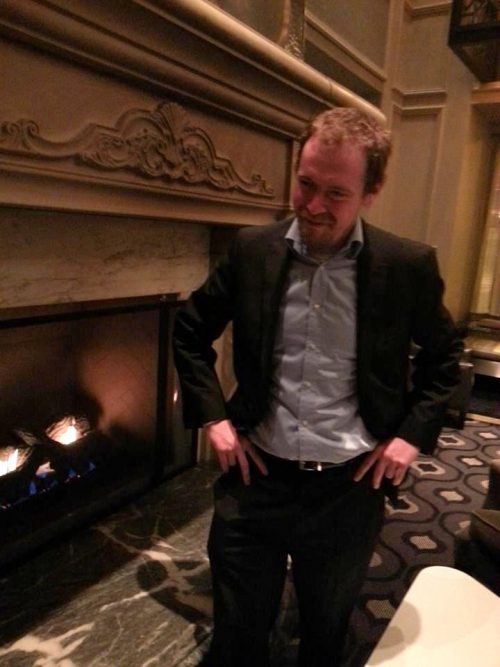
.
Satan, Bring Me My Guitar (Or: Use the Condom—
You’ll Be Happy You Did Later)
Three times I wished to find an end
Twice you called and said it was the end.
What’s the use of all this trying this wanting-more
your denials your holding-together?
What use the machinations the theatre the holy pornography?
Mister, there are mystical stains everywhere
I go
these days; I don’t want
or at least
don’t want to want
or at least
don’t want to admit I want or want to want—
Oh, to hell with such
roundabout poetics.
My blood is 7 degrees Celsius.
I am not alone.
There are others,
brothers of near-freezing blood; it’s that near
that keeps us close, that forms us.
What makes this room
suddenly Dantean in demeanor?
The pastel skulls are too much,
recurring details of a Día de los Muertos
acid trip gone horrifyingly wrong.
I want to compose a song.
Here is the refrain:
Our Father, I would like to complain
of senseless erections.
I have been meaning to say so
for years, but it only occurred to me now
because I have your attention.
Okay…that song would suck, I admit,
but that doesn’t make me not want to
(or want not to) compose it. So:
Satan, bring me my guitar!
But you don’t want me to compose
a song for you.
What do you want?
You always talked about commitment
at any cost,
so I will prove I am committed.
I wrote the title of this poem
before I was done
and now I will commit
to that parenthetical condom,
which I included just to amuse myself
and my friend David Bowen
with whom I was IMing when I was
drafting this poem.
So, here goes:
You visit me
And I tell myself,
Use the condom; you’ll be happy you did later.
There should be a barrier here
something to block the past
from entering the present unhindered.
.
Let’s Not Imagine
1.
Let’s say night never arrives again.
Would the moon disappear in a sun-flash?
And what if all the flowers in all the poems—
flowers I’ve often never seen or heard of, except in poems,
what if these flowers were petrified?
What would we make of these colorful stones
planted throughout world literature?
2.
I read about a torture method
used by rebels in South Africa. Necklacing.
You place a car-tire around your victim’s neck,
then you pour gasoline in the tire, and—
Well, you know what comes next.
The victim’s face disappears in a sun-flash
and all flowers should blossom stone forever.
Let’s not imagine the kind of corpse necklacing leaves.
Those eyes will not see the stars of night.
Some survived. Would you want to meet a survivor?
.
Antinomies and Intensities
1.
Askew, askew, I float. The darkling waters
turn my helpless boat round.
The rippling dots of starlight—dead stars, dead.
The rippling of starlight on the water
and overhead. Silently, I merge the world
with my mind. Silently, it becomes one world.
I wobble myself upright and balance.
The body’s warm intensities, its needs,
its abilities. All of this, turning slowly
on the night’s river.
2.
I watch the weather gather
yellow doom into its belly.
The water will wash runnels through the sand.
It will wash away the self-monuments of man.
Say your prayers. The sky won’t listen.
Say them anyway.
The sound of human voice in the storm,
this might be of more value than we can guess.
3.
There is a vowel in the wind. A voiceless vowel.
There is joy in the void. A hopeless joy.
I will ride the waters over the cliff
into the abyss.
I will embrace this apocalypse—
.
Ruinwind Sonnet
A hot wind has blown across land and ocean
bringing a desert howl, a desert death, with it.
The wind has changed the angle of your hair,
changed the angles of our hearts.
I sniff the air and smell death. I sense the depleted
souls of uranium shells.
Among so many battlegrounds and burial grounds,
how do I dare to be happy?
Your honest high-pitched laughter
carves the air, counter to the grain of the distant wind
that has burned my day to a ruin.
But that is just a metaphor in my life,
a neat poetic phrase.
Others, their lives are literally burned.
—Okla Elliott
.
Okla Elliott is an assistant professor at Misericordia University in northeast Pennsylvania. He holds a PhD in comparative literature from the University of Illinois, an MFA in creative writing from Ohio State University, and a certificate in legal studies from Purdue University. His work has appeared in Cincinnati Review, Harvard Review, Indiana Review, The Literary Review, New Ohio Review, Prairie Schooner, A Public Space, Subtropics, and elsewhere, as well as being included as a “notable essay” in Best American Essays 2015. His books include From the Crooked Timber (short fiction), The Cartographer’s Ink (poetry), The Doors You Mark Are Your Own (a novel), Blackbirds in September: Selected Shorter Poems of Jürgen Becker (translation), and Pope Francis: The Essential Guide (nonfiction, forthcoming).
.